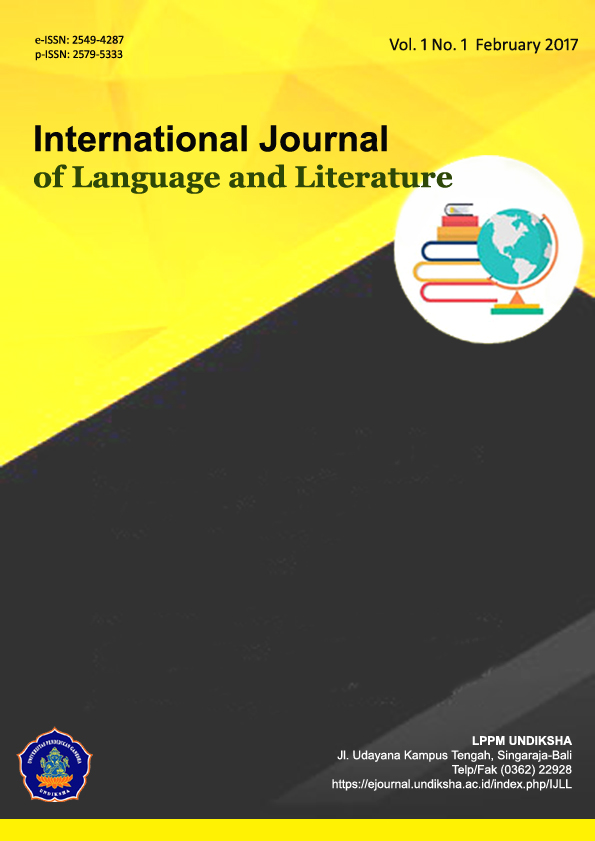TEACHERS’ READINESS IN INSERTING THE 21ST CENTURY SKILLS FOR TEACHING ENGLISH AT PRIMARY SCHOOLS
DOI:
https://doi.org/10.23887/ijll.v4i2.30294Kata Kunci:
21st century skills, primary English teachers, teachers’ readinessAbstrak
The development of 21st century affects all sectors including the education field. The importance for preparing students with knowledge and skills affects the learning process in this era. Life skills and balanced assessment are the demands in 21st century era. These demands need to be prepared by the teachers since primary education. Therefore, it is important to analyze primary English teachers’ readiness in inserting 21st century skills in terms of lesson planning, teaching and learning process and assessing students’ learning as the important aspect on learning process. This study used embedded mixed method using qualitative description and supported with descriptive quantitative analysis. The subjects of the research were 11 primary English teachers in Denpasar. A questionnaire was used to measure the readiness of the teachers in inserting the skills in the aspects of learning process. The data obtained were calculated and classified into its level of teachers’ readiness. It was found that the teachers perceived themselves as ready in inserting the 21st century skills. This is indicated by 1) their positive responses toward the knowledge about the 21st century skills, 2) they were confident in perceiving their implementation toward 21st century skills, and 3) they were ready in inserting 21st century skills in terms of lesson planning, teaching and learning process and assessing their students’ learning activities. It is expected that the teachers sustain their readiness in inserting the 21st century skills in teaching English for their students at schools.Referensi
Arch, R. (2010). K a m eha m eha sch o o ls re se a rc h & e va luati o n d i v i si o n. 1–25. www.21stcenturyskills.com
Artini, L. P., & Padmadewi, N. N. (2020). Cyclic relective model for promoting prospective english teachers’ creativity in instructional designing. 438(Aes 2019), 1–5. https://doi.org/10.2991/assehr.k.200513.001 DOI: https://doi.org/10.2991/assehr.k.200513.001
B Boholano, H. (2017). Smart social networking: 21st century teaching and learning skills. Research in Pedagogy, 7(1), 21–29. https://doi.org/10.17810/2015.45 DOI: https://doi.org/10.17810/2015.45
Balla, E. (2018). English language and its importance of learning it in Albanian schools. Academic Journal of Interdisciplinary Studies, 6(s2), 109–114. https://doi.org/10.2478/ajis-2018-0035 DOI: https://doi.org/10.2478/ajis-2018-0035
Bialik, M., & Fadel, C. (2015). Skills for the 21st century: What should students learn? Center for Curriculum Resedisgn, May, 18. https://curriculumredesign.org/wp-content/uploads/CCR-Skills_FINAL_June2015.pdf
Chu, S., Reynolds, R., Notari, M., Traveres, N., & Lee, C. (2016). 21st century skills development through inquiry-based learning from theory to practice. Springer Science. https://doi.org/http://dx.doi.org/10.1007/978-981-10-2481-8 DOI: https://doi.org/10.1007/978-981-10-2481-8
Dalton, C. C., & Gottlieb, L. N. (2003). The concept of readiness to change. Journal of Advanced Nursing, 42(2), 108–117. https://doi.org/10.1046/j.1365-2648.2003.02593.x DOI: https://doi.org/10.1046/j.1365-2648.2003.02593.x
Gamar, M. M., Al Faruq, M. S., & Lina, L. (2018). Challenging the Indonesian primary education in industrial revolution 4.0 era. Social Science, Education, and Humanities Research, 269(CoEMA), 46–48. https://doi.org/10.2991/coema-18.2018.12 DOI: https://doi.org/10.2991/coema-18.2018.12
Handayani, N. (2017). Becoming the effective English teachers in the 21st century: what should know and ehat should do? 1st English Language and Literature International Conference (ELLiC), 6 May, 2017, 156–164.
Idaho Department of Education. (2016). 21st century classroom lesson Plan. Idaho Preferred, 3–10. https://idahopreferred.com/wp-content/uploads/2016/09/2015_Trout-Lesson-Plan.pdf
Jan, H., & Jrf, N. /. (2017). Teacher of 21 st century: characteristics and development. Research on Humanities and Social Sciences, 7(9), 2225–0484. www.iiste.org
M. Balajadia, D. (2017). Gauging the ict-based teaching readiness of preservice teachers in the light of 21st century education. PEOPLE: International Journal of Social Sciences, 1(1), 11–30. https://doi.org/10.20319/pijss.2015.s11.1130 DOI: https://doi.org/10.20319/pijss.2015.s11.1130
Nasution, R. A., Rusnandi, L. S. L., Qodariah, E., Arnita, D., & Windasari, N. A. (2018). The evaluation of digital readiness concept: existing models and future directions. The Asian Journal of Technology Management (AJTM), 11(2), 94–117. https://doi.org/10.12695/ajtm.2018.11.2.3 DOI: https://doi.org/10.12695/ajtm.2018.11.2.3
Norahmi, M. (2017). 21st-century teachers: the students’ perspectives. Journal on English as a foreign Language 21 st century teachers: The students’ perspectives. 7(1), 77–96. DOI: https://doi.org/10.23971/jefl.v7i1.538
Nurul Asri, A. (2019). Designing a 21st century assessment in EFL learning context. KnE Social Sciences, 3(10), 335. https://doi.org/10.18502/kss.v3i10.3915 DOI: https://doi.org/10.18502/kss.v3i10.3915
Padmadewi, N. N., Artini, L. P., & Agustini, D. A. (2017). Pengantar Micro Teaching. Jakarta: PT RajaGrafindo Persada.
Rusdin, N. M. (2018). Teachers’ readiness in implementing 21st century learning. International Journal of Academic Research in Business and Social Sciences, 8(4), 1293–1306. https://doi.org/10.6007/ijarbss/v8-i4/4270 DOI: https://doi.org/10.6007/IJARBSS/v8-i4/4270
Syamsuri, H. A. S., & Ishaq. (2010). Makalah : guru, generasi Z, dan pembelajaran abad 21. Repositori Unismuh.Ac.Id, 1–15. http://www.unismuh.ac.id/wp-content/uploads/2018/05/Tantangan-Guru-Generasi-Z-dan-Pembelajaran-Abad-21.pdf
Trilling, B., & Fadel, C. (2009). 21st Century learning skill. San Francisco: Jossey Bass.
Unduhan
Diterbitkan
Cara Mengutip
Terbitan
Bagian
Lisensi
IJLL Journal provides immediate open access to its content on the principle that making research freely available to the public to supports a greater global exchange of knowledge.

This work is licensed under a Creative Commons Attribution-ShareAlike 4.0 International License







